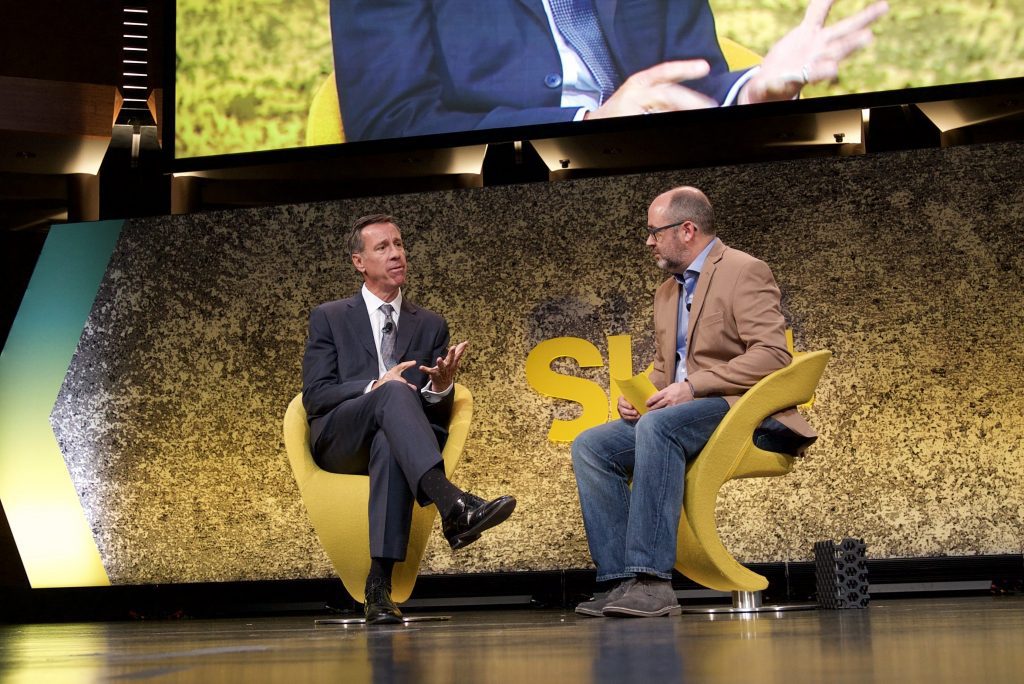Skift Take
Sorenson makes a valid point: Hotels in the U.S., by law, can't discriminate who they will allow to stay with them. The hosting of meetings and events is more of a gray area, though. And a hotel could always decline to host a particular group for a variety of reasons. But the bigger question is: Should hotels and accommodations providers be able to say whose views are acceptable and whose are not?
Marriott International CEO Arne Sorenson isn’t afraid to make statements about social and political issues, but he was also careful to distinguish between what his company’s responsibility is in determining which guests and groups are welcome to stay or meet at its hotels.
Speaking at the Skift Global Forum in New York City on September 27, Sorenson addressed the current controversy surrounding the Marriott Crystal Gateway hotel’s upcoming hosting of an Act for America conference in Arlington, Virginia. Act for America has been identified by the Southern Poverty Law Center as an anti-Muslim hate group. It was the first time the company has spoken publicly about the controversy.
In his remarks, Sorenson seemed to suggest the larger issue at hand is whether or not hotel companies should be able to determine who can stay or meet with them.
Last week, the Muslim Advocates group sent an open letter to Sorenson, imploring him and his company to cancel Marriott’s commitment to hosting the conference which is scheduled to take place from October 2-3.
Speaking publicly for the first time about the controversy, Sorenson said, “The fact they are having a meeting with us and using our hotel does not mean we support their point of view. If I could wave a magic wand, I’d love to have it so that those types of groups never exist.”
He added, “The same hotel, interestingly, annually has had the Center for Islamic Relations hold their meeting there. When they hold meetings there, I get emails telling me that we’re hosting Islamic terrorists.”
This type of issue is a common conundrum that the hospitality business finds itself in: Should hotels try to decide whom they would allow to stay or host meetings and events at their hotels.
In August, Airbnb made news when it declared that it would ban all white nationalists from using its platform to find a place to stay during the Unite the Right Free Speech protest that took place in Charlottesville, Virginia. While some groups embraced Airbnb’s decision to do so on moral grounds, Sorenson’s comments seemed to suggest that taking those kinds of actions could have a chilling effect or set a precedent for discrimination.
“So, what can we do about it?” Sorenson asked. “What’s practical? What’s legal? Do we really want, as a society, for companies like Marriott and the peers in our industry and others to sit and make judgments or points of view on people sitting in our meeting rooms? I shudder to think that we really expect that my role or Marriott’s role is to say your views are not acceptable in our hotels and that another person’s views are …
“I know someone will say, ‘That’s a cop out.’ There are points of view that are wrong. I believe that. [There are] many that I personally believe are wrong. But I don’t think it’s practical or constructive to say you’ll be the one to make that judgement. The theme is that we are in the hospitality business. We are serving people from all around the world, from all walks of life, with all points of views, equally and with a genuine welcome, with people who are equally diverse. Our arms need to be open.”
Sorenson also said that when it comes to issues that pertain directly to his company’s more than 750,000 employees, he will never hesitate to speak out.
“I would never go out and speak about gun control and choice issues, not because I don’t have my own personal opinions on those, but they’re not germane to our business,” Sorenson said. “When you talk about inclusiveness, the LGBT community, travel policy — these are fundamentally important to our associates and to our business. I speak about this for them. I do think we are an industry that is important and which can be a powerful symbol of hospitality and inclusion all around the world.”
Shortly after Sorenson’s interview at the Skift Global Forum, Color of Change, an online racial justice organization said it received the following statement from Marriott regarding their open letter to Marriott, urging them to cancel Act for America’s upcoming conference: “We are a hospitality company that provides public accommodations and function space. Acceptance of business does not indicate support or endorsement of any group or individual.”
Sorenson on Cuba
Given the uncertainty regarding the Trump Administration’s policies on travel to Cuba and U.S. businesses being able to operate there, Sorenson expressed hope that Marriott would continue to be able to do business in the country.
“I wish I had clearer answers for it,” Sorenson said. “We are operating one hotel today, a Four Points by Sheraton. We have two others which are signed and in development, and a handful we are talking about.”
He said that the three agreements that Marriott has with the Cuban government, allowing the company to operate in Cuba, expire in two years.
“But what happens with renewing those authorizations? I don’t know,” Sorenson said. “What we are hopeful about is that the [Cuban] administration will say that, at a minimum, whomever is there can be grandfathered in.”
He added, “When you look at our [U.S.] history with Cuba … it’s a country we put in the penalty box for 50 years. We accomplished nothing. We have the ability to accomplish so much more and create a relationship that’s so much stronger. I think it would be absolute folly to go back to what it was before.”
Have a confidential tip for Skift? Get in touch
Tags: marriott, sgf2017, skift global forum
Photo credit: Marriott CEO Arne Sorenson (left) doesn't think it should be up to hotels to decide who should be allowed to stay or meet in hotels and who shouldn't. He's pictured at Skift Global Forum in New York City September 27, discussed topical issues with Skift co-founder Jason Clampet. Skift / Skift

